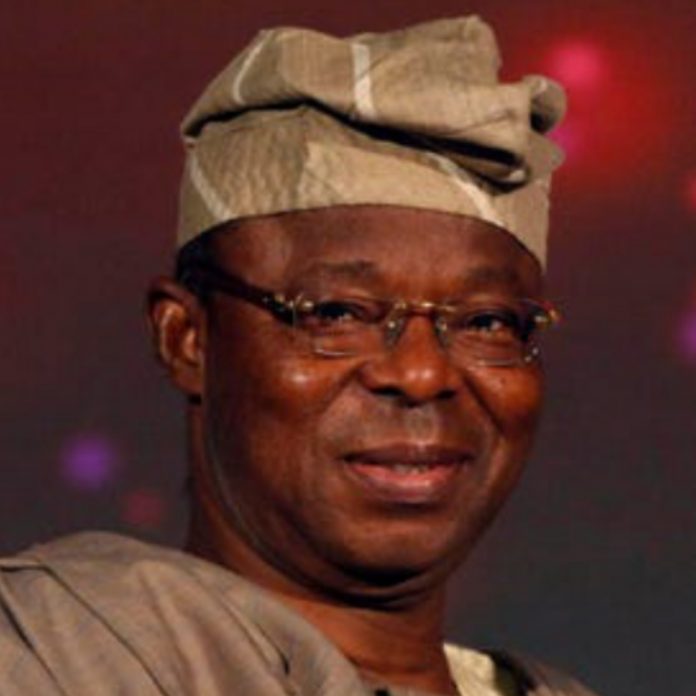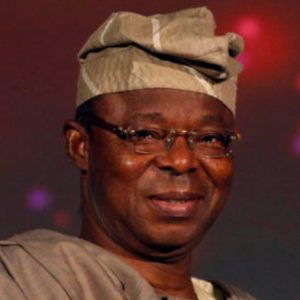Dr. Oba Otudeko.
By Our Reporter
The legal tussle between Ecobank Nigeria Ltd and frontline businessman, Dr. Oba Otudeko has taken a very interesting turn as the Federal High Court sitting in Lagos has fixed July 4 for hearing in the bankruptcy suit filed by Ecobank Nigeria Ltd against the businessman,
The suit, marked FHC/L/BK/19/2015, was scheduled for Tuesday, but Justice Akintayo Aluko adjourned same in view of court’s heavy workload.
However, Ecobank’s counsel Mr Kunle Ogunba, SAN, informed the judge that the adjourned date of July 4 was too long, in view of certain developments that made an urgent hearing of the bankruptcy action necessary.
He said Ecobank had filed an affidavit for the record, exhibiting a notice of discontinuance of its appeal and the judgment of the Supreme Court delivered on January 27, 2023 wherein the Supreme Court affirmed the indebtedness of Otudeko’s firms to Ecobank.
But the court noted that since counsel representing Otudeko had already been notified of the July 4 date, it would not be fair to change same.
The court consequently directed Ogunba to author a correspondence for abridgment of time for hearing of the bankruptcy action and to copy Otudeko’s counsel as legally enjoined.
Ogunba further informed the court that the situation was identical with the winding up action Ecobank filed against Siloam Global Services Ltd which was meant to come up Tuesday but was adjourned to same July 4.
It would be recalled that the Supreme Court had dismissed an appeal by Honeywell Flour Mills Limited challenging the judgement of the Court of Appeal in the debt dispute with Ecobank Nigeria Limited, affirming the indebtedness of the company to the tune of N5.5 billion to the bank.
On the 6th of August 2015, Honeywell, and its sister firms, Anchorage Leisures Ltd and Siloam Global Ltd, sued Ecobank before the Federal High Court in Lagos over repayments of a N5.5 billion debt.
In the suit, the companies urged the Federal High Court in Lagos to declare that “having paid the sum of N3.5 billion in cumulative settlement of their total outstanding indebtedness” (of N5.5 billion) to Ecobank, “they owned no further debt obligation” to Ecobank “arising from their banker-customer relationships.”
As a result, they also asked the court to hold that Ecobank “was obligated to issue letters of discharge, release collaterals by which the prior indebtedness was secured.” In addition, Honeywell and its sister companies begged the court to compel Ecobank to “update” their status on the “Credit Risk Management System Portal of the Central Bank of Nigeria.”
But in its defence, Ecobank argued that an agreement was reached between it, Honeywell, Anchorage and Siloam on 22 July 2013, “for a definite settlement of N3.5 billion to be paid in terms of N500 million immediately and the balance of N3 billion before the exit of the CBN examiners from” Ecobank’s offices. Ecobank had contended that the repayment agreement period was for six months as it rejected Honeywell and its sister companies’ request to “pay the balance over a one-and-half-year period in three equal half-yearly instalments.”
The bank informed the court that the debt repayment agreement “lapsed in August 2013.” But in its judgement, the judge, Ayokunle Faji of the Federal High Court, upheld the arguments of the Honeywell Group and granted their prayers. Dissatisfied with the verdict, Ecobank in 2015, approached the Court of Appeal. In its decision, the appellate court overturned the judgement of the Federal High Court, setting the stage for the Supreme Court’s appeal which was resolved in favour of the Bank.


